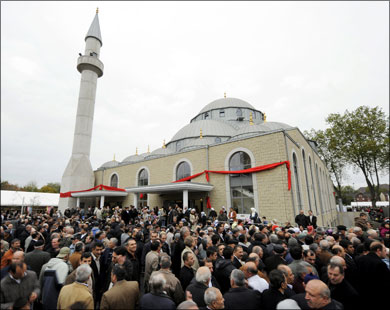 Nearly every day I get an e-mail about a campaign on behalf of yet another luckless adherent of an unpopular religion who's languishing in some gulag. If it's not the Baha'is or Christians in Iran, it's the Muslims and the Falun Gong in China.
Nearly every day I get an e-mail about a campaign on behalf of yet another luckless adherent of an unpopular religion who's languishing in some gulag. If it's not the Baha'is or Christians in Iran, it's the Muslims and the Falun Gong in China.
Recently, the Pew Forum on Religion and Public Life published a massive report documenting how 70 percent of the world's 6.8 billion people live in countries with "high" restrictions on religion.
Among the world's 25 most populous countries, Egypt, Iran, Indonesia and Pakistan have the most religious restrictions while Brazil, the United Kingdom, Japan, the United States, Italy and South Africa have the fewest. The report does not include scores for uber-repressive North Korea because researchers found certain data impossible to get.
Although 76 percent of the world's 198 countries guarantee religious freedom in their constitutions, the report said only 27 percent respect those guarantees. Afghanistan is an example of a country that on paper promises religious freedom, then says a citizen's faith must line up with Islamic law.
U.S. ally Kazakhstan, surprisingly, rates almost as high as Afghanistan in government restrictions. Both are Muslim-majority countries that make it a crime - or at least quite unpleasant - to convert, despite the language of Article 18 of the 1948 Universal Declaration on Human Rights that says everyone has a right to change their religion and to practice it publicly.
Countries such as Saudi Arabia blithely ignore this, says the report, which graded countries in two categories. The first is government hostility to religion in the form of onerous laws, prison sentences and police brutality. China, Uzbekistan, Burma and Vietnam lead the pack here.
Social hostility, the second category, pinpoints governments that are more hands off, but do nothing to stop citizen attacks on unpopular religious groups or assaults by one religion against another.
Russia and Ethiopia score high here, it said, because the Orthodox Church has free rein in both countries to persecute other religions. In Greece, non-Orthodox Christians aren't even allowed to have a legal presence.
Jordan, a U.S. ally headed by a king with a huge interest in interfaith relations, ranks "very high" in social hostility between Muslims and Christians. Conversion from Islam to Christianity is not allowed there.
Orthodox Copts are the chief targets in Egypt, where the kidnapping of female teenage Copts who are forced to convert to Islam and marry Muslims is at epidemic levels. Eygpt's refusal to go after those perpetrators or punish mobs that tear down churches is what rocketed that country to the top of this persecution derby.
Turkey also got a high persecution rating through incidents such as the torture-murders of three Christians in a particularly horrible 2007 case. This month, in response to a Swiss vote banning the construction of new minarets in that country, three Muslim thugs entered a historic Syrian Orthodox church in Diyarbakir in eastern Turkey and threatened to kill the priest unless he tore down his bell tower. Police have posted guards at the church but the priest is a marked man.
The most depressing statistics are out of India, a democracy with enormous amounts of Hindu-on-Christian violence where little is done to punish the perpetrators. In the state of Karnataka, as many as 100,000 pre-teen girls are "devadasis"; sex slaves kidnapped or sold by their parents to service male worshippers at Hindu temples.
This despite the devadasi system having been outlawed in 1947. When these unfortunate girls age out, they're sold to brothels and more often than not, end up dying of AIDS.



